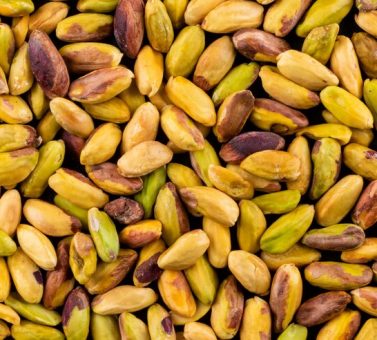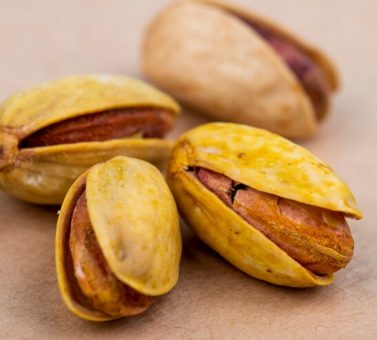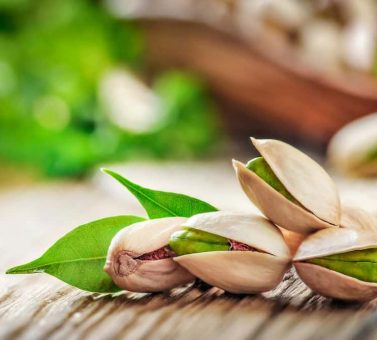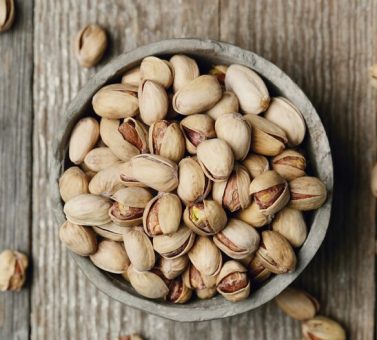
The pistachio is a member of the cashew family (Anacardiaceae) and is historically the oldest nut that has been consumed for centuries. They tend to grow in dry areas in warm climates. The name pistachio is derived from the Greek word “Pistakion” which means green nut. They have a hard white covering around them and a thin reddish skin around the green kernels.
Pistachios originate from the Middle East and Central Asia. They are borne in clusters and are mainly wind pollinated. The pistachio is elongated and spherical, 1.5 to 2 cm long. The hard coating around the core tends to peel off on one side without leaving the green core.
Pistachios are rich in antioxidants such as flavonoids, carotenoids, lutein, zeaxanthin, anthocyanins, proanthocyanidins, etc. It also contains vitamin B6, B1, protein, fiber, copper and phosphorus. In addition, they are one of the low-calorie and low-fat nuts. Therefore, pistachios have significant health benefits. For example, they help with weight loss, promote heart health, reduce the risk of cancer, and more.
One hundred grams of pistachios contain:
Calories – 557
Carbohydrates – 28 grams
Fiber – 10.3 grams
Fat – 44.4 grams
Protein – 20.6 grams
Health benefits of pistachios
Pistachios contain good fats such as polyunsaturated fats and monounsaturated fats. The unsaturated fats in pistachios nourish the heart.
Pistachios also help people with diabetes and help reduce the risk of stroke. This is due to the appropriate amount of phytosterols in pistachios. It reduces the absorption of food carbohydrates in the body.
Carbohydrates are converted into sugar in the body. Excess carbohydrates in the body lead to increased blood sugar levels. The healthy fats in pistachios help lower blood pressure in the body. In addition, they are rich in antioxidants, carotenoids, polyphenols, vitamin E and vitamin C. All of these nutrients help improve the elasticity of your blood vessels.
Pistachios are rich in antioxidants such as lutein, beta-carotene, selenium, flavonoids, proanthocyanidins and gamma tocopherol. These antioxidants help prevent cell damage and free radicals in the body. In addition, lutein, beta-carotene, and flavonoids help reduce sun damage, prevent age-related damage, and improve skin tone.
Pistachios also reduce heart inflammation. Inflammation can lead to heart attacks and other cardiovascular diseases. Pistachios contain polyphenol, which reduces the risk of heart diseases by strengthening the anti-inflammatory, anti-platelet properties and also by improving the inner lining of the heart and blood vessels.
Vitamin C, a powerful antioxidant, is also present in pistachios. It helps reduce oxidative stress and prevent or reduce damage caused by free radicals. As a result, it reduces inflammation and promotes healthy aging.
Pistachios also contain vitamin E, which nourishes and moisturizes the skin from within. They also control insulin levels and promote blood circulation, which helps reduce acne. Vitamin E also helps reduce the risk of cardiovascular disease and prostate cancer caused by inflammation.
Pistachios contain copper, manganese, vitamin B6, phosphorus and thiamin. These minerals and nutrients help restore the microbiota (microbial environment in digestive health).
Strengthens the gut microbiota, shapes the gut epithelium and protects against pathogens. It also reduces intestinal inflammation and boosts metabolism. In addition, the high fiber in pistachios helps regulate digestion by bulking up the stool. In addition, it helps improve bowel movements.
Pistachios promote healthy bacteria known as probiotics, which have an incredibly beneficial effect on gut health. Probiotics help increase the absorption of healthy nutrients such as protein, vitamins and minerals from the diet. In addition, they help remove harmful bacteria from the intestinal tract. They also help lower the pH level in the colon, which allows stool to pass through it more easily.
Pistachios contain a good amount of L-arginine, which our body uses to make nitric oxide. It helps increase blood flow when you feel aroused.
Vitamin E in pistachios helps improve erectile function and reduce estrogen production in men’s bodies. In addition, pistachios are a popular nut for men in the Middle East because they improve sperm quality in the quality of erections.
It is one of the few foods that are a rich source of aphrodisiac properties. Aphrodisiac properties promote better sexual arousal, especially in men.
Pistachios also help prevent and treat PCOS in women. Because it lowers insulin levels in the body and balances hormones. According to studies, nuts containing PUFA and MUFA help balance insulin, androgen and cholesterol levels.
Pistachios contain healthy nutrients such as potassium, calcium, folate, iron, and the right amount of protein and fiber, which are essential for the healthy growth of a child. But women should always consult their doctor before taking anything during pregnancy.
Pistachios are a low glycemic food. They have a low carbohydrate content, which releases less sugar into the blood when our body metabolizes the carbohydrates in sugar. Therefore, they help reduce blood sugar levels and have a low glycemic index value.
Low glycemic index foods are recommended for type 2 diabetes because they release low blood sugar and lower blood sugar levels. However, a diabetic should eat only 1-2 servings of pistachios, not every day but every alternate day. Therefore, 30 grams of pistachios per day is enough for healthy consumption.
Pistachios are rich in melatonin, a hormone that is secreted in the body and makes us sleep. Melatonin is a sleep hormone that regulates the sleep-wake cycle and the quality of our sleep. Therefore, eating pistachios at night 2 to 3 hours before sleep can improve the quality of sleep.
Pistachios are rich in fiber. Eating fiber may help you lose weight because it keeps you fuller for longer and reduces calorie intake, both of which help with weight loss.
Pistachios also improve your metabolic rate, which helps you burn more calories. The fiber in pistachios also helps in digestion. Improving digestion increases the rate of metabolism. In addition, they are rich in protein, which helps increase energy levels and the body’s metabolic rate.
They contain healthy fats such as polyunsaturated fats and monounsaturated fats. These fats are soluble and do not accumulate in the body to cause weight gain. As a result, pistachios help to lose weight.
Pistachios are rich in healthy nutrients and low in calories. These properties also help in weight loss. In addition, they induce a feeling of fullness, which helps suppress appetite. Our body cannot absorb all the calories in pistachios. They can absorb only 5% of total calories, thus leading to healthy weight loss. A handful of pistachio nuts a day for breakfast or an evening snack can help you lose weight naturally.
A study shows that including pistachios in a behavioral weight loss diet leads to healthy weight loss and lower blood pressure.
Excessive consumption of pistachios increases blood pressure. In addition, you may experience light-headedness, blurred vision, dizziness, and fainting. Also, consuming salted pistachios may raise your blood sodium levels and increase the risk of various cardiovascular diseases, including high blood pressure.
Pistachios contain a lot of fiber. Therefore, the consumption of pistachios in large quantities disrupts digestion and causes diarrhea, muscle cramps, abdominal pain, intestinal pain and irritable bowel syndrome. Fructan in pistachios can also cause allergies in the digestive system.
People who are allergic to tree nuts should avoid eating pistachios. Allergies to tree nuts may cause vomiting, difficulty swallowing, itchy mouth, nasal congestion, muscle cramps, and nausea.
Pistachios contain oxalate and methionine. Eating too much pistachios can increase the secretion of oxalate and methionine in the body. Oxalates can bind to calcium and potassium, resulting in the production of calcium and potassium oxalates. At the same time, methionine may be converted to cysteine and may lead to the formation of cystine kidney stones.
Excessive consumption of pistachios causes weight gain. Because consuming more pistachios daily will increase your calorie intake and thus increase your weight.
Eating roasted pistachios may increase the risk of cancer in the body. Pistachios roasted at high temperatures may produce acrylamide, a carcinogen that is responsible for the growth of cancer cells in the body and may increase the chance of developing cancer.
Pistachios are healthy nuts for the human body because they contain vital nutrients such as vitamin C, vitamin E, folate, protein, fiber and minerals. In addition, they are also rich in antioxidants such as flavonoids, beta-carotene, zeaxanthin, anthocyanins and proanthocyanidins. These nutrients heal inflammation, reduce the risk of cardiovascular disease, improve sleep quality, improve digestion, and promote weight loss. However, everything is beneficial only if you eat them in moderation. So eat a handful (approximately 30 grams) of pistachios every day. It can help provide all your health benefits.
Excessive consumption of pistachios may also have several side effects such as allergies, weight gain, risk of cancer, kidney stones, digestive problems and high blood pressure. As a result, eating pistachios in moderation may provide you with various health benefits while avoiding any dangerous side effects.
 01/11/2023
01/11/2023
Help to lose weight Pistachios are a good source of protein, with about 6 grams of protein per ounce. They are also low in calories. About 50 pistachios barely contain 160 calories. Because of this combination of high protein and low calories, they are a satisfying snack that can help you shed extra pounds. Reduce […]
 01/11/2023
01/11/2023
(frequently asked questions) Q: How many pistachios should you eat a day? a. A handful of pistachios in the evening can help you reap all the benefits and boost your metabolism as well. s. Is it okay to eat pistachios every day? A- Eating any nuts should be in moderation. So eating pistachios five times […]
 01/11/2023
01/11/2023
Pistachios: nutritional value, benefits and side effects The pistachio is a member of the cashew family (Anacardiaceae) and is historically the oldest nut that has been consumed for centuries. They tend to grow in dry areas in warm climates. The name pistachio is derived from the Greek word “Pistakion” which means green nut. They have […]
 01/11/2023
01/11/2023
What is pistachio? Pistachios are the seeds of the pistachio tree. They are usually green and have a slightly sweet taste. They are called nuts, but botanically pistachios are seeds. People have been eating them for thousands of years. Nuclei can have different colors, from yellow to shades of green. They are usually about an […]